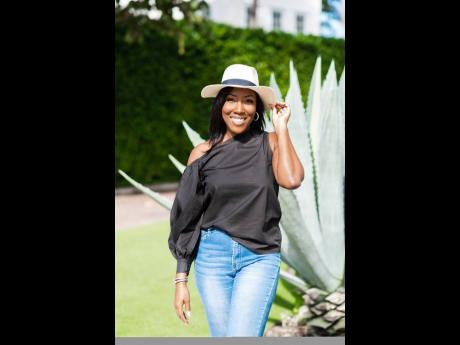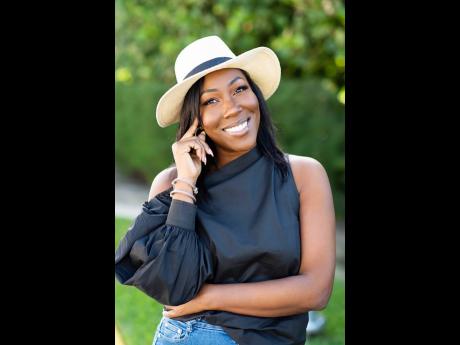Egg freezing gave Rochelle Gapere freedom of choice and fertility
As women age, they become more concerned and aware of the proverbial sand in the hourglass indicating that their biological window to natural conception is quickly closing. The pressure is further accentuated by statements like ‘wah yuh a wait pon’ or ‘yuh nah have no pickney’ that are often casually thrown around by friends and family members. Then adding to an already emotionally draining situation, there is often the weight of wanting to have it all – the perfect balance of career and family.
Nevertheless, as more women become open and knowledgeable of the options available to them, such as surrogacy, egg freezing and in-vitro fertilisation (IVF), many are breathing a sigh of relief, realising that there are ways to enjoy a full life, including children, without fearing that their time will run out. Speaking with The Sunday Gleaner, Rochelle Gapere, an attorney-at-law, happiness coach and author, shared her story, which ultimately led to her decision to freeze her eggs, ensuring her ability to have a child and give her child siblings on her timeline.
“I have never been one to subscribe to traditional norms like get married at 25 and have your first kid at 28. I have never been that person. So loosely, yes, I knew I wanted to get married, but I always also envisioned this big life where I was travelling and living life on my own terms. I was never in a rush to do everything, but I am also well aware of the fact that, as women, we have a certain timeline in terms of when we are naturally able to bear children. So, I always believed in exploring options. With that said, once I turned 30, I was in a relationship, and though I had friends who had kids, all I could think about was going to the next carnival,” she shared.
By age 35, her relationship ended and then she began feeling despair, not because she was newly single, but because she had to contemplate whether or not she would be able to find the ideal partner to begin her family. Casually, on a routine check-up with her dermatologist, the conversation of fertility was brought up. Then her doctor suggested that she go ahead and freeze her eggs. Without second-guessing or too much hesitation, Gapere began the process, preparing to go to Barbados to freeze her eggs, then carrying on with her life. She shared that it wasn’t doubt that she would be able to have children that fuelled her decision, but the idea of being able to have more than just one.
THERE ARE OPTIONS
Obstetrician and gynaecologist Professor Joseph Fredrick, who is widely recognised for his pioneering work in assisted reproduction technology or IVF in Jamaica, says that while age is usually one of the most significant factors causing women to become concerned with fertility management, other medical reasons can also be aided by IVF, including egg freezing and surrogacy.
“One option available to older women who have issues with natural conception is using younger eggs from a younger donor or freezing their own young eggs to use later on. But beyond age, there is also PCOS (polycystic ovary syndrome) which causes the eggs not to mature, and mature eggs are needed for fertilisation. There is also tubal disease. That is where the Fallopian tubes are blocked, eventually causing a challenge. Still, there are places locally where women and men can access treatment to enhance their ability to start families,” Professor Fredrick revealed.
One such place is the Hugh Wynter Fertility Management Unit, of which he was a former director. He is still active in gynaecology alongside his daughter Dr Sharifa Fredrick.
“At the unit, we provide storage of eggs as well as in-vitro fertilisation which is the most well-known of assisted reproduction techniques. We also have solutions to help patients with the cost of these procedures. I want to say to women, plan your life and make informed decisions. Speak with your doctors, and don’t ignore things like pain in the abdomen or extremely painful periods. In some cases, these are a cause for major concern,” he said.
The Hugh Wynter Fertility Management Unit, formerly the Advanced Training and Research in Fertility Management Unit, was established in 1979 by Professor Hugh Wynter, in whose honour the unit was renamed on July 17, 2008. Their mission is to provide high-quality gender-sensitive services that are responsive to the rights, needs and concerns of internal and external clients and stakeholders; maintain professional, ethical and legal codes of conduct; innovation and excellence in teaching, training, research and clinical services and continuously improve the sexual and reproductive health of Caribbean peoples and empowering them to protect their health.
ASSOCIATED COST
A major concern when contemplating matters of fertility management is usually cost. However, at the Hugh Wynter facility, one cost solution provided is the donation of eggs to the bank, and in return, the cost of procedures are reduced. Additionally, Gapere recommends doing a bit of research, as in some cases, insurance and bursaries exist to help.
“I paid US$5,500 for mine. My medication was about US$1,500. Typically, what makes it so expensive [to do] it in America is the cost of the medicine. So, my friend who was doing it at a similar time as me paid US$13,000, and I paid US$7,000, [which] is a significant difference. There are even grants available to women who want to explore the options. So definitely seek information here. We spend money on other things, so we may have to rework our budget. I would say to women evaluate how much it is worth to them to have a child,” she explained.
LEGAL FRAMEWORK
As more women locally exercise the additional freedom that exists when it comes to fertility, more conversations are happening around the topic, even as it relates to laws and policies surrounding surrogacy and IVF. Currently, existing laws are abstract. However, recently there has been a major push to implement a proper legal framework. Speaking with The Sunday Gleaner, University Counsel Laleta Davis-Mattis, who is a part of a team spearheading the implantation of specific laws for the governance of surrogacy and IVF, said discussions are aimed at creating a unified policy.
“We started the discussions back in 2019, but COVID-19 slowed down progress in the area. What we had aimed to do was engage the various government agencies, primarily the Ministry of Health and its related entities, in terms of rationalising policy for Jamaica. Currently, you can describe it as fragmented or generally, there is really no legal framework encompassing all the areas involved in IVF. The unit has been at the forefront of the technology,” she stated.
“This is a crucial conversation that must be had. There is a lot of investment involved in the usage and storage of sperm and embryos. We have to also understand [that] there are persons who don’t even believe in these procedures. But we really still believe that the framework needs to be established. We are literally currently in dialogue with the Ministry of Health and the [National] Family Planning Board, and the intention is that we will seriously look at the legal aspect of it and determine the best thing for Jamaica. We not only want to look at IVF but fertility issues. So, of course, we have surrogates, the rights of donors and even the sperm and embryo and the child. It is a very involved discussion, and we want to have all the agencies involved in this matter [on board],” Davis-Mattis continued.
PEACE OF MIND
For Rochelle Gapere, even beyond medical and legal arguments, making the decision to take charge of her life and fertility has given her a contentment that has been life-changing.
“I never realised that there was so much in my brain subconsciously. When I would meet guys or [date], I was also thinking could it be this one, or can I get married to him? Now I date with freedom. I am empowered when I date. I am making decisions from a place of power. I am not just looking at this man with the view of having children because my clock is ticking. The peace that it has given me is incalculable. I cannot even quantify how liberating it is because I know I have that in the backdrop. When I hear my friends now who are just so conscious and [riddled] with anxiety, I get it, but there is a sigh of relief that I can make well-thought-out decisions without having to every day [worry] about finding a partner to have children,” she said.
She encourages others to simply make the right decisions for themselves and do exactly what makes them the happiest because “happiness is your responsibility”.


